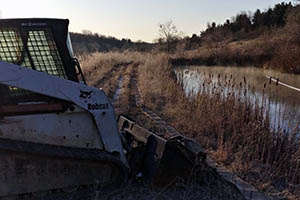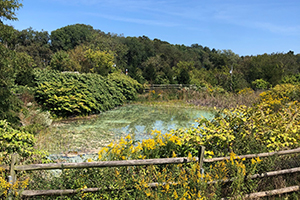SUCCESS STORY
Montour Run Watershed Remediation
The passive water treatment systems in the southwest corner of Allegheny County were in need of repair after being in place for as much as 15 years. Without the efforts of the Montour Run Watershed Associations (MRWA) acid mine drainage pollutants would be coming back into the Montour Run and would jeopardize its clean water and fishery status. The pollutants can affect macroinvertebrates such as insects, worms and snails as well as fish that live in the stream.The Montour Run Watershed is located approximately 12 miles from downtown Pittsburgh and is comprised of portions of six communities, Coraopolis, Imperial, and Findlay, North Fayette, Moon and Robinson Townships.

The MRWA protects, remediates and acts as a long-term steward of the Montour Run Watershed.


Project Goals
The goal of this project is to prevent acid and iron compounds from surrounding abandoned mines from entering the Montour Run Watershed through cleanup and repairs near North Fork, McCaslin Road and Boggs Road. By performing necessary maintenance on passive water treatment systems, the MRWA is looking to maintain a viable fishery with improved water quality.
Strategies & Results
The treatment projects generally consist of a series of inter-connected settling ponds lined with acid buffering materials. The lining materials interact with the incoming mine water drainage to adjust pH levels and precipitate metals so that the out-flowing water can support the life forms that live in the streams. Over time, the lining materials lose their effectiveness as it becomes buried in sediment from the treatment process. It can also become “worm-holed” as water follows the path of least resistance through it and bypasses treatment. After each site was assessed to determine what work was needed, thorough, individualized maintenance and enhancement plans were developed and implemented for each location.
Maintenance tasks ranged from refreshing limestone in vertical flood ponds by washing and reinstalling to replacing baffle curtains which help to control the flow and circulation of the water to improve treatment efficiency. Collected vegetation and iron solids were removed from the treatment wetland, settling ponds, channels and ditches. Portions of removed vegetation were replanted to encourage plant reestablishment.
To prolong the life of the treatment system and improve its effectiveness, a diversion ditch was cleaned and modified to keep gradient surface water from flowing into the treatment system. Enhanced aeration systems were also installed to improve the system by increasing oxidation of the iron and therefore its removal from the mine drainage.
As a result of the MRWA efforts, many tons of acid mine drainage pollutants are being removed from the water each year. The favorable conditions can support the food chain and allows the Pennsylvania Fish Commission to stock the stream with trout annually.

